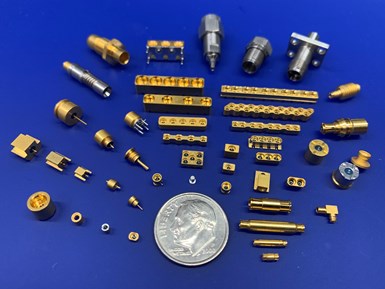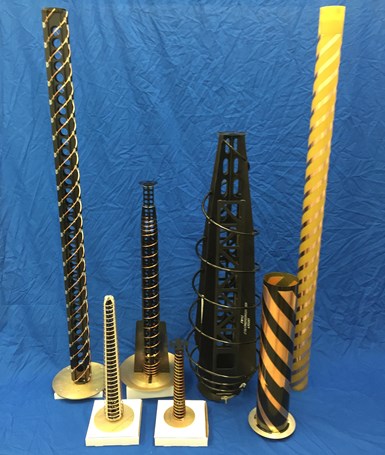Defining Your Niche
Develop your shop into a niche shop and your customers will come. Become an expert in your niche and customers will keep coming back to you.
Our company is fortunate that we have become a niche shop and been in business more than 70 years. We attribute our niche development to forming our capabilities around our customers’ needs. This is what led to one of our customers purchasing us in 2012.

Rosenberger N.A. produces parts such as these miniature microwave connectors used on advance radar equipment, most of which are glass-sealed.
Because of our success, when I hear companies defining themselves as general machine shops, I want to ask “why?” Why be like everyone else? I guess you like a lot of competition!
Niche shops tend to be very successful. They have less competition and higher profit margins. They are both assets and partners for their customers. They move up the supply chain by providing more value-added processes.
That said, it might take a few years to establish your company as a niche shop. You might need higher skilled workers. Some customers might require you to take on more risk or investments or require a higher quality level and/or certifications. Your shop will need to be a good, clean, 5S-organized facility.
So how do you determine your niche(s)? First of all, you need to use the 80/20 rule. Answer the following questions to help start determining some niches:
- Which industries are 80% of your customers in?
- Which customers are 20% of the most profitable?
- What are the most profitable products you make for them?
- What types of services do you provide for them?
Make lists and filter that information to help define your sweet spot.
It is okay to have a few niches if they complement each other, have similar quality requirements and/or use similar equipment. It is also good to have a few niche industries to aid in riding out market swings. For example, the communication industry includes niches in satellites, defense and commercial radar, microwave testing and measurement, and wireless communication equipment. Different industries use similar parts, but the product technology is similar.
You need to utilize your current equipment and expand on your knowledge of the customer(s), products, parts and processes. You do not want to retool your facility, but any future purchase should support your niche.
It is not rocket science. Rather, it is a process of elimination. It might also be a good time to fire a problematic customer or two.

The company manufactures larger components as well, such as assembled and bonded satellite antenna ranging in length from 8 to 65 inches.
Many successful niche shops are service niches, such as EDM shops or shops that produce large parts.
You need to become an expert in your niche. You need to research your customer’s product so you can “talk the talk” when communicating with them.
One of our successes occurred when a customer asked us to bring an outside process in-house to better control the process. It was a gamble to invest in a new process. To offset the risk, we developed a team to research the process and equipment and, in a few months, we became experts in the process.
Once you become the expert, you need to expand your marketing to let others know about your capabilities. Do a little research. What product is your customer manufacturing? Who are their competitors? Which trade shows do they exhibit or what publication do they advertise in? A little research goes a long way to reduce your limited marketing funds.
Going to a general job shop show, with other similar companies, might not be in your best interest. Your marketing needs to more targeted. You will also need to develop an elevator speech so when someone asks what you do, you can tell them in only one sentence. An example is: we manufacture parts for satellites and connectors for radar systems.
Make sure your website is kept up-to-date. Customers like to see part samples. Make sure you get permission to show your customers’ parts on your site. (Often, less is more.)
You also need to revisit your list every few years. Can you expand your niche by adding value-added or other related processes? Partnering and networking is a great way to expand your niche. Is there another shop that can complement your niche or expand it until you can justify adding additional capacity?
You also need to research your competitors, keep an eye on their websites and try to keep ahead of them. You should also educate your employees on the parts you are making, including who the customer is and how the parts are used. Make sure employees can also “talk the talk.”
Even though we are now part of a large corporation, we are still reviewing and bringing in processes to expand some of our niches. We constantly review our products, processes, customers and competitors.
So, why be a general machine shop? Instead, develop into a niche shop and survive. Build a needed niche and your customers will come. Become an expert in your niche and customers will keep coming back to you.
About the Author
Ted Toth is a senior technical advisor at Rosenberger North America. He was owner and president of Toth Technologies before it was purchased by Rosenberger in 2012. He also served as treasurer, vice chairman and chairman of the board for the National Tooling and Machining Association. Contact: ted.toth@rosenbergerna.com or 856-662-8700.
Read Next
A Tooling Workshop Worth a Visit
Marubeni Citizen-Cincom’s tooling and accessory workshop offers a chance to learn more about ancillary devices that can boost machining efficiency and capability.
Read MoreEmerging Leaders Nominations Now Open
Here’s your chance to highlight a young person in your manufacturing business who is on the path to be a future leader moving your company forward.
Read MoreDo You Have Single Points of Failure?
Plans need to be in place before a catastrophic event occurs.
Read More














.jpg;maxWidth=300;quality=90)




